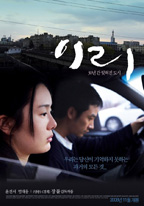

Iri
South Korea 2007
Genre:
Drama
Director:
Zhang Lu
Cast:
Yun Jin-seo
Uhm Tae-Woong
Yoo Yeong-gyoo
Mohammed Jano
Go Wol-hwon
Choi Eun-jeong
Kim Joon-seong
Hong Ji-yeon

Iri
Story: Jin-seo (Yun Jin-seo) is born shortly after the devastating explosion at Iksan-Station in 1977. Because of the accident she
has the intellectual level of a child. She works as a janitor and takes care of the residents of a home for the aged. Her brother
Tae-Woong (Uhm Tae-Woong) is a taxi driver and always worried about his sister. Jin-seo often gets raped and has already a number of
miscarriages behind her, but she doesn't care much about it since she doesn't really know about sexuality. However, her brother suffers
in place of her. Jin-seo is fascinated by the Chinese language and tries to learn Chinese at the local school. People around her all seem to
be hurt individuals and emotionally distant, but her brother, whom she loves very much, is seriously worried about her future life.
Review: It's not easy to write the summary of a movie that delivers so little story as "Iri" does. In fact, there is no real
storyline, the events aren't unfolding on screen but frozen in their tracks. There is an incredible emotional distance building up between
the viewer and the characters on screen, which apparently is a result the director was aiming for, but in the end makes the movie a true test
of patience. The characters also aren't introduced to us, but we are simply thrown into the movie and then have to derive necessary information
from the little info inserted in elusive ways. This info isn't much to begin with, but there also isn't any inducement to put some effort
into deriving it either. A certain kind of impassiveness and coldness runs through the whole film which becomes really tiring and repulsive.
If you are looking for any message then look somewhere else. The pictures and individuals can only induce a feeling of hopelesness that
will end in frustration on part of the viewer.
Thematically, "Iri" somewhat resolves around the explosion at the "Iri Station" in 1977. A cargo load of dynamite that was being transported from
Incheon to Gwangju suddenly ignited and claimed the life of dozens of residents. The little industrial town eventually changed its name into
Iksan. In "Iri" we see the 30th anniversary of the incident, but apart from the title and a few interviews at the beginning there is no real
connection to these events storywise. So what you don't get is the character exploration of people that still carry the scars of this accident.
Only the model of the station that Tae-woong is working on throughout the movie is a cross reference to the tragedy. Therefore, you can't
help but to ask yourself what director Zhang Lu, being of Chinese-Korean lineage, wanted to achieve with this movie. We still won't get
an answer to that question even when the credits roll.
Art-house-cinema is said to be especially subtle and profound in meaning. "Iri" is art-house-cinema, yet delivers neither subtlety nor
any profoundness. You could maybe give the ending some credit by saying that it has some impact, but the rest of the film absolutely lacks
any meaning. Captured with a static camera we get to see the main characters daily routine in shots lasting several minutes. Already after a few minutes
this becomes extremely monotonous and somniferous. There is no action or progression and in order to underline the movie's coldness
even further it didn't even get a soundtrack. We accompany the characters on their silent wanderings through the town and their dull
inner life. However, as already stated we don't get any real insight into latter. The other individuals, too, be it the Chinese language teacher,
the illegal immigrant or the little girl, all remain mere sketches.
The only interesting about "Iri" is Jin-seo's way of dealing with her sexuality. She can't truely relate to it and in one scene even tells her
friend, who says that she is interested in Tae-woong, that she loves her brother herself. She actually huddles under her brother's blanket
being half-naked, which is in return rewarded with a kick. Tae-woong hasn't got an easy life with having to take care of her and so he
has to fetch her from the doctor on numerous occasions because she once again had a miscarriage. He tries to look after her, but naturally
he can't always have his eyes on her. He beats up her rapists, reporting them to the police isn't an option for some strange reasons, and
a girl that is indirectly responsible for the a raping is simply raped by him herself as some kind of punishment. Of course, it's impossible to
build an emotional bond to such individuals.
Yun Jin-seo ("Secret Love", "Oldboy") apparently puts in quite some effort into her performance and it's easy to see that she has talent as
an actress. However, when it comes to her and even more obviously Uhm Tae-Woong ("Chaw") you can't miss the fact that the script didn't
provide anything for them to work with. The characters are weakly drawn or even not sketched out at all and the individuals they have contact with
are even more blank sheets of paper that enrich the film with exactly nothing. In "Iri" nothing can arouse the interest of the viewer and so
we have to ask what Zhang Lu wanted to achieve with this film. A movie as dull and monotonous as this one can only drive you into suicide
with its depressive undertone. That is if you haven't already fallen asleep before the credits roll... The ending might be the only thing
that can at least achieve something similar to affecting us. Other than that "Iri" is simply an uninspired art-house flick that works well
as a sleeping pill.

Disclaimer





















